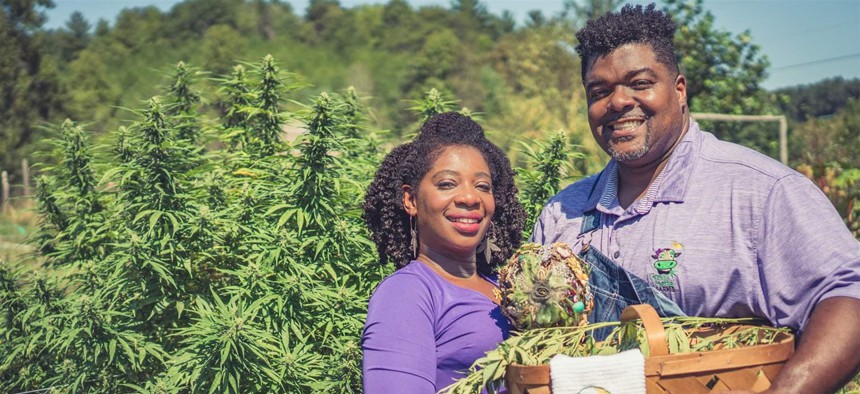Where Are the Black Hemp Farmers?

Clarenda Stanley-Anderson and her husband, Malcolm Anderson Sr., are hemp farmers in Liberty, North Carolina. Stanley-Anderson wants to expand the representation of hemp farmers, even if she’s far from the average industry insider. Courtesy of Donnie Rex
Black farmers make up a mere 1.4 percent of the country’s 3.2 million farmers. Some see an opportunity to improve representation in the new sector of legalized hemp.
This story was originally published by Stateline, an initiative of The Pew Charitable Trusts.
COLUMBIA, Md. — Clarenda Stanley-Anderson will be the featured farmer of Hemp History Week, an educational campaign in June focused on a newly legal crop that’s at the center of a risky, potentially billion-dollar industry.
Stanley-Anderson is considered a pioneer in the nascent hemp agricultural community, for educating others and encouraging young farmers to bring hemp back to the U.S. agrarian landscape, according to history week organizers.
It’ll be the first time that the Hemp Industries Association annual initiative, which boasts celebrity endorsements and events across the country, will feature a nonwhite farmer.
Stanley-Anderson wants to expand the representation of hemp farmers, even if she’s far from the average industry insider. Black farmers are a mere 1.4 percent of the country’s 3.2 million farmers, according to the 2012 U.S. Department of Agriculture Census of Agriculture. In North Carolina, where Stanley-Anderson and her husband own Green Heffa Farms in the town of Liberty, black farm operators are nearly 3 percent of farmers.
While black farmers aren’t as visible, Stanley-Anderson is part of a developing community. As growers, processors and entrepreneurs, black professionals across the country are working to carve out a space in a trendy industry that’s projected to reach $1.9 billion in U.S. hemp-based product sales by 2022, according to the Hemp Business Journal, an online publication that tracks the industry.
Individuals and organizations are in the early stages of building networks of black farmers and processors to ensure black agriculture professionals get their share of hemp riches. But it’s hard for everyone to take on the risk.
Black farmers have long been discriminated against by lending institutions like the USDA. And with a limited population of growers, land, resources and sometimes access to the information networks that enable farmers to move quickly, they could be left behind again with hemp.
“Black farmers are becoming extinct,” said Lamar Wilson, founder of SunJoined, a nationwide network of hemp growers and processors with farmers in Kentucky, Kansas and Colorado. “This is an opportunity to bring them back and to actually provide a profitable resource, but also a resource that can be used for so many different things.”
Not everyone is optimistic hemp is the future for the small and under-resourced farmer, unless there are regulatory efforts to ensure they can be competitive.
“Most minority farms are on the verge of survival,” said Joe Trigg, a farmer and city council member in Glasgow, Kentucky, who’s running as a Democrat for state commissioner of agriculture. “The last thing they need is something else to drag them down.”
A Mixed Opportunity
Hemp has been touted by Democratic and Republican senators as a lifeline nationwide to farmers, many of whom are struggling under declining commodity prices. Farmers can harvest three types of hemp: fiber; grain or seed; or floral material extracted for plant resin, including cannabidiol, popularly known as CBD. Hemp’s uses span more than 25,000 products, including textiles, biofuel, ropes, cosmetics, food and beverages.
Agriculture professionals say the high-value crop can be particularly well-suited to black landowners, who typically have smaller farms and less overall sales than white farmers. Black farmland accounts for 0.4 percent of U.S. farmland, and sales account for 0.2 percent of total U.S. agriculture sales, according to the USDA. Hemp can be cultivated in tight spaces, especially when harvested for fiber and seed, which are planted in narrow rows.
“We’re just seeing black farmers emerge in the market,” said Bonita Money, founder of the Los Angeles-based National Diversity Inclusion and Cannabis Alliance, another group connecting hemp farmers of color.
Although hemp is legal, regulatory risks complicate the crop’s long-term outlook. Some states are positioning themselves to compete, but it’s unlikely the market can sustain hemp production in every state—unless there’s a significant increase in product demand, according to a February 2019 report from the College of Agriculture, Food and Environment at the University of Kentucky.
“Technology may dictate that production will ultimately be concentrated in relatively few states where hemp can be grown at the lowest cost of production and transported shorter distances for processing,” the report said.
Some states, including North Carolina and Kentucky, adopted hemp early and began growing it in research or pilot programs prior to Congress’ passage of the 2018 farm bill, which legalized hemp widely. Before December, when President Donald Trump signed the bill, federal law treated hemp as a quasi-controlled substance because of its relation to marijuana.
Neither Kentucky nor North Carolina tracks the race of growers or processors, according to spokespeople from the states’ departments of agriculture.
With federal legalization, many states are launching hemp pilot programs, transitioning from pilot to large-scale programs, while some are choosing to keep hemp farming illegal. Regardless, competition is increasing as growing hemp becomes more accessible.
Roscoe M. Moore, Jr., a former assistant U.S. surgeon general who attended a recent hemp workshop in Columbia, Maryland, thinks that as more money enters the hemp market, there will be few minorities involved. He pointed to the Maryland state law that called on regulators to reflect racial, ethnic and geographic diversity among those licensed to work in the medical marijuana industry. No black applicant was awarded a grower’s license, according to news reports, and there were no repercussions, Moore said.
“Business relationships are the gold standard for America,” said Moore, who advises several biotechnology and pharmaceutical companies. “Business is based on commerce. There’s not any excuse why we’re not involved, we just haven’t had the experience.”
But even when approached, black farmers sometimes decline the opportunity. Trigg, the Kentucky city council member, said a state official encouraged him to participate early in Kentucky’s pilot program. Trigg declined because of the crop’s association with marijuana and law enforcement oversight.
Even though marijuana and hemp are separate strains of cannabis, with hemp having a lower level of tetrahydrocannabinol, or THC—the main psychoactive component in the cannabis plant—farmers like Trigg worried about a stigma in being associated with the crop.
“There was still so much skepticism associated with it, and everyone was worried,” said Trigg, who plans to grow his first hemp plant this year. “You start growing marijuana on your farm and you’re black?”
Limiting Restrictions
Stanley-Anderson, whose nickname is Farmer Cee, didn’t initially connect hemp to equity until she didn’t see herself reflected among decision makers. The North Carolina Industrial Hemp Commission, for example, whose nine members develop rules and licensing fee structures for the industry, is all male. Eight members are white. Two are from law enforcement. None are African American.
Members, who serve as volunteers, are appointed by the governor, commissioner of agriculture and General Assembly. Their selection criteria are written into state law.
“I agree. It’s all white. It’s all male. But that’s the way it was set up,” said commission Chairman Tom Melton, also deputy director of the North Carolina Cooperative Extension Service at North Carolina State University. “Maybe the law needs to change to indicate some sort of representation. That’s beyond the scope of our commission.”
Federal law requires applicants for hemp licenses to not have had a drug felony in the past 10 years. The advocacy groups Vote Hemp, Drug Policy Alliance and others were able to get that decreased from a lifetime ban, but were unsuccessful in getting removed, said Eric Steenstra, president of Vote Hemp, in an email to Stateline.
“Our goal is to allow all farmers who want to grow hemp to do so with as limited restrictions as possible,” Streenstra wrote. Vote Hemp, based in Washington, D.C., is a national nonprofit advocacy organization that supports a free market for industrial hemp.
For some black farmers, the felony restriction on hemp is a lost opportunity. Blacks and Latinos are far more likely to have marijuana-related drug felonies, according to the Drug Policy Alliance.
People coming out of prison desperately need jobs, said Ashley Smith, co-founder of Black Soil: Our Better Nature, an organization that supports black farmers, growers and producers in Kentucky. “There has to be some compromise where we can bring folks who are in need of jobs working land that is in need of labor,” Smith said. In Kentucky, hemp laborers are subject to background checks.
Some places are trying a system to offer some restitution for the disproportionate impact of drug enforcement on black communities. Some California cities, for example, have adopted cannabis equity programs that provide business development, loan assistance and mentorships for minority and low-income entrepreneurs. Oakland has permits set aside for people of color.
“No one is doing that with hemp,” said Stanley-Anderson, who grew up on a farm in Alabama.
Jackson Garth, national director for industrial hemp for Minorities for Medical Marijuana, an advocacy group based in Orlando, Florida, has been working to get equity goals or requirements written into hemp legislation in Georgia and South Carolina. While the measures never made it into legislation, he’s encouraged South Carolina has awarded licenses to farmers of color he’s worked with.
“We’re going to have to have set-asides for black and brown farmers, so farmers aren’t forgotten,” Garth said.
Garth’s group, known as M4MM, is in the early stages of setting up a co-op program for hemp. Garth, who’s also an executive of an industrial hemp processing company in Atlanta, is educating farmers on the crop and helping them get licenses.
“A lot of times,” Garth said, “it’s a lack of information that we’re receiving, and even when we get the information, it’s too late.”
At least two states—Illinois and California—have enacted a Farmer Equity Act in recent years to ensure socially disadvantaged farmers and ranchers are included in food and agriculture laws. States with programs to support minority-owned businesses, new and beginning farmers and other targeted groups, could potentially apply to commercial industrial hemp producers unless there are restrictions in place to exclude hemp production, according to the National Conference of State Legislatures.
Some critics argue that these programs can feel like a Band-Aid. “There’s a slew of people who fall under minority,” said Kentucky farmer Charles Jones, citing white women, veterans and other farmers of color. “So, they can say they’re doing this for minorities, but the black farmer still gets left out within this.”
Leveling the Playing Field
More than 100 people attended the recent daylong hemp informational event organized by Morgan State University, a historically black university in Baltimore, Maryland. A handful of the attendees were black. Among them, few were farmers. Instead, most were entrepreneurs or academics connected to Morgan State.
Willie May, vice president of research and economic development for Morgan State, touted its vision for an industrial hemp program, including education, applied and academic research and quality control services. The school plans to offer bachelor’s and master’s programs in medicinal plant science and a certificate program in hemp and cannabis.
Hemp is providing an opportunity for historically black colleges and universities, known as HBCUs, to tap into a convergence of interest among farmers, legislators and consumers.
In Maryland, a state hemp research program is open to most universities. Other states, like Florida and North Carolina, narrowed the field by approving their land-grant universities as their primary research institutions. (Morgan State is not a land-grant university.) Supporters say this is important because the land grants typically do not receive an equal share of state funding. Some states fail to honor a federal match for their HBCUs, while they exceed that match for predominantly white institutions, known as PWIs.
The 2018 farm bill requires states to report to Congress how much funding they’re providing their land-grant HBCUs and predominantly white institutions, in what’s considered a first step toward acknowledging the inequity.
“What we were doing with [the] Farm Bill and this research opportunity is helping to level the playing field between HBCUs and PWIs,” Florida U.S. Rep. Al Lawson, a Democrat, said in a statement to Stateline.
Stanley-Anderson, who plans to plant three acres of hemp on her 16-acre farm, said the crop has prompted intergenerational conversations between older black farmers and younger entrepreneurs interested in the crop’s versatility.
“There’s an opportunity for resurgence,” Stanley-Anderson said.





